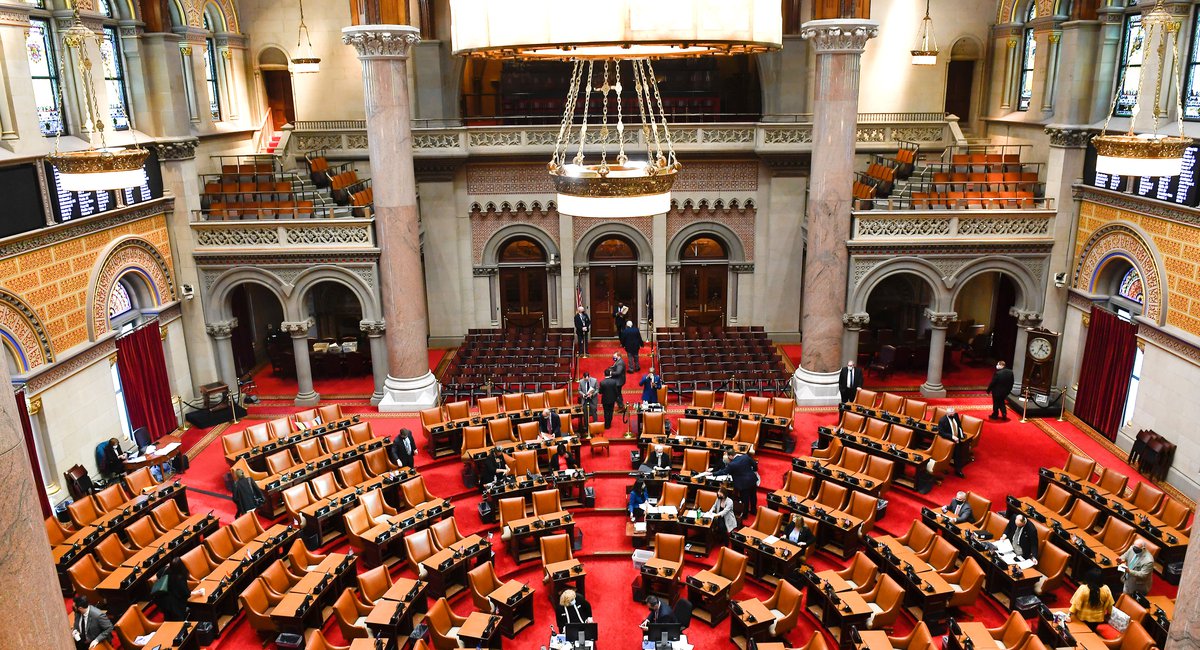New Yorkers can now place bets on sporting events from their own home. Or in a bar. Or on the street. Or, well, anywhere in the state.
The state Gaming Commission gave the green light to four mobile betting operators to begin taking wagers Saturday, making New York at least the 18th state to permit online sports gambling in some form.
As of 9 a.m., the mobile betting apps had all been given the all-clear to launch in New York, which joined neighboring states like New Jersey, Connecticut and Pennsylvania in allowing mobile sports wagering.
New York state lawmakers and then-Gov. Andrew Cuomo cleared the way for mobile wagering last April, when it was included as part of the state budget. It’s expected to be a money-maker for the state, with New York charging a far higher tax rate than other large states.
Here’s what you need to know about mobile sports wagering in New York:
Why is New York allowing this?
Gambling interests had been actively lobbying New York to permit sports gambling and, eventually, mobile betting ever since the U.S. Supreme Court struck down a federal ban in 2018.
New York allowed the state’s private and Native-run casinos to begin taking sports bets in 2019. And in April, Cuomo and lawmakers tucked the mobile-betting provision in the state’s $212 billion spending plan.
The reason why state policymakers were eager to embrace it is simple: Money.
The state is implementing a 51% tax on gross revenues by mobile sports betting operators. That could draw in some significant money for the state: By the time mobile betting is fully implemented, the state Division of Budget estimates it will bring in more than $480 million a year to the state’s coffers.
Where will the money go?
The money from the state tax on mobile betting revenue will, for the most part, be divided up the same way other gambling revenue is.
Under state law, about 80% of that revenue is flagged for two purposes: elementary and secondary education, and property tax relief.
The mobile betting law also flagged money for two other purposes.
For the first year, 1% of the state’s mobile wagering tax revenue will be reserved for treating problem gambling and educating people about gambling addiction. In subsequent years, it will be $6 million a year.
Another 1% in the first year will go toward state grants for sports programs for underserved youths. In subsequent years, $5 million a year will go toward that purpose.
How is this legal?
New York’s state constitution actually has a gambling ban, though you may not know it because of how much, well, gambling happens in the state.
That’s because the ban has a few major exemptions – for the state lottery, for horse racing and, crucially, for up to seven private casinos across the state.
You may notice: Those exemptions do not explicitly allow mobile sports wagering. That’s where lawmakers and then-Governor Cuomo got a bit creative.
The computer servers for the various mobile betting platforms will be placed at one of the state’s private casinos, of which four are up and running. So with the mobile bets being routed through the casinos, lawmakers and Cuomo made the case that mobile betting is allowed under the constitution.
They even wrote it into the law’s “legislative intent” section.
“It is the sense of the legislature that this provision is not contravened by a statute that authorizes the acceptance of a wager by an individual who is betting by virtual or electronic means and the wager is accepted through equipment located within a licensed gaming facility,” the law reads.
Which apps are allowed to take mobile bets?
To start, the Gaming Commission is giving four mobile apps approval to launch:
- DraftKings Sportsbook
- FanDuel
- Caesars Sportsbook
- BetRivers
Those are the four operators that have met all of the state’s regulatory requirements at this point, according to the commission.
All told, the commission granted mobile licenses to companies operating nine different apps.
The remaining five – BallyBet, BetMGM, Wynn Interactive, Resorts World Bet and PointsBet – are still awaiting final approval to launch.
